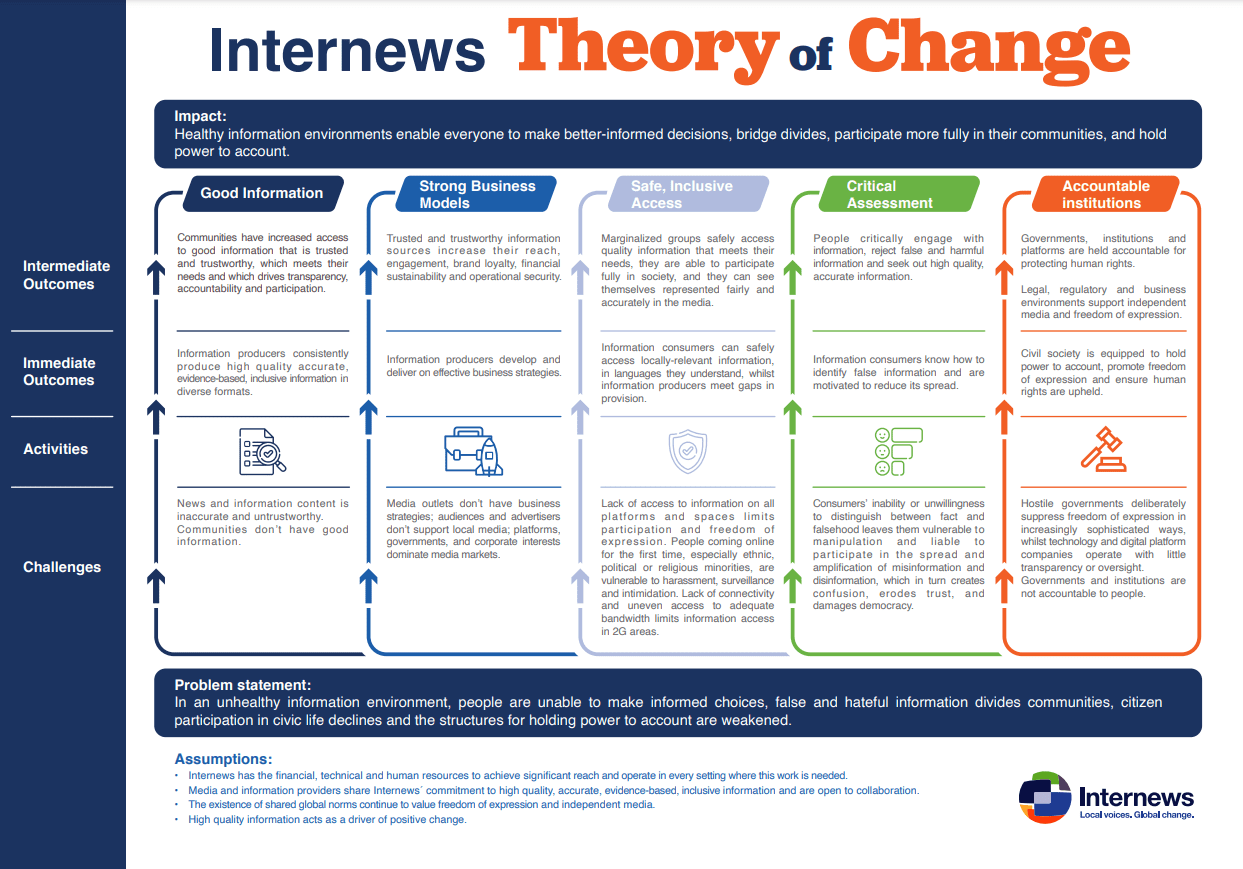
Click here to view full Theory of Change.
Impact:
Healthy information environments enable everyone to make better-informed decisions, bridge divides, participate more fully in their communities, and hold power to account.
Intermediate Outcomes:
- Good Information
- Communities have increased access to good information that is trusted and trustworthy, which meets their needs and which drives transparency, accountability and participation.
- Strong Business Models
- Trusted and trustworthy information sources increase their reach, engagement, brand loyalty, financial sustainability and operational security.
- Safe, Inclusive Access
- Marginalized groups safely access quality information that meets their needs, they are able to participate fully in society, and they can see themselves represented fairly and accurately in the media.
- Critical Assessment
- People critically engage with information, reject false and harmful information and seek out high quality, accurate information.
- Accountable Ins
- Governments, institutions and platforms are held accountable for protecting human rights.
- Legal, regulatory and business environments support independent media and freedom of expression.
Immediate Outcomes
- Good Information
- Information producers consistently produce high quality accurate, evidence-based, inclusive information in diverse formats.
- Strong Business Models
- Information producers develop and deliver on effective business strategies.
- Safe, Inclusive Access
- Information consumers can safely access locally-relevant information, in languages they understand, whilst information producers meet gaps in provision.
- Critical Assessment
- Information consumers know how to identify false information and are motivated to reduce its spread.
- Accountable Institutions
- Civil society is equipped to hold power to account, promote freedom of expression and ensure human rights are upheld.
Challenges
- Good Information
- News and information content is inaccurate and untrustworthy. Communities don’t have good information.
- Strong Business Models
- Media outlets don’t have business strategies; audiences and advertisers don’t support local media; platforms, governments, and corporate interests dominate media markets.
- Safe, Inclusive Access
- Lack of access to information on all platforms and spaces limits participation and freedom of expression. People coming online for the first time, especially ethnic, political or religious minorities, are vulnerable to harassment, surveillance and intimidation. Lack of connectivity and uneven access to adequate bandwidth limits information access in 2G areas.
- Critical Assessment
- Consumers’ inability or unwillingness to distinguish between fact and falsehood leaves them vulnerable to manipulation and liable to participate in the spread and amplification of misinformation and disinformation, which in turn creates confusion, erodes trust, and damages democracy.
- Accountable Institutions
- Hostile governments deliberately suppress freedom of expression in increasingly sophisticated ways, whilst technology and digital platform companies operate with little transparency or oversight.
- Governments and institutions are not accountable to people.
Problem Statement:
In an unhealthy information environment, people are unable to make informed choices, false and hateful information divides communities, citizen participation in civic life declines and the structures for holding power to account are weakened.
Assumptions:
- Internews has the financial, technical and human resources to achieve significant reach and operate in every setting where this work is needed.
- Media and information providers share Internews´ commitment to high quality, accurate, evidence-based, inclusive information and are open to collaboration.
- The existence of shared global norms continue to value freedom of expression and independent media.
- High quality information acts as a driver of positive change.